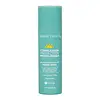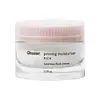What's inside
What's inside
 Key Ingredients
Key Ingredients

 Benefits
Benefits

 Concerns
Concerns

 Ingredients Side-by-side
Ingredients Side-by-side

Benzophenone-3 6%
UV AbsorberButyl Methoxydibenzoylmethane 1%
UV AbsorberEthylhexyl Methoxycinnamate 7.5%
UV AbsorberEthylhexyl Salicylate 5%
UV AbsorberWater
Skin ConditioningCaprylic/Capric Triglyceride
MaskingCorn Starch Modified
AbsorbentCetearyl Olivate
Diethylhexyl 2,6-Naphthalate
EmollientC12-15 Alkyl Benzoate
AntimicrobialSorbitan Olivate
EmulsifyingGluconolactone
Skin ConditioningSqualane
EmollientGlycerin
HumectantCyclopentasiloxane
EmollientTocopheryl Acetate
AntioxidantSodium Hyaluronate
HumectantXanthan Gum
EmulsifyingCarbomer
Emulsion StabilisingAminomethyl Propanol
BufferingSodium Benzoate
MaskingPhenethyl Alcohol
MaskingCaprylyl Glycol
EmollientPhenoxyethanol
PreservativeTrisodium Ethylenediamine Disuccinate
Potassium Sorbate
PreservativeBenzophenone-3 6%, Butyl Methoxydibenzoylmethane 1%, Ethylhexyl Methoxycinnamate 7.5%, Ethylhexyl Salicylate 5%, Water, Caprylic/Capric Triglyceride, Corn Starch Modified, Cetearyl Olivate, Diethylhexyl 2,6-Naphthalate, C12-15 Alkyl Benzoate, Sorbitan Olivate, Gluconolactone, Squalane, Glycerin, Cyclopentasiloxane, Tocopheryl Acetate, Sodium Hyaluronate, Xanthan Gum, Carbomer, Aminomethyl Propanol, Sodium Benzoate, Phenethyl Alcohol, Caprylyl Glycol, Phenoxyethanol, Trisodium Ethylenediamine Disuccinate, Potassium Sorbate
Water
Skin ConditioningCaprylic/Capric Triglyceride
MaskingPropanediol
SolventGlycerin
HumectantSqualane
EmollientOrbignya Oleifera Seed Oil
EmollientCetearyl Olivate
Sorbitan Olivate
EmulsifyingPentaerythrityl Tetraisostearate
EmollientPseudozyma Epicola/Camellia Sinensis Seed Oil Ferment Extract Filtrate
HumectantSodium Hyaluronate Crosspolymer
HumectantCeramide NP
Skin ConditioningCeramide AP
Skin ConditioningBuddleja Officinalis Flower Extract
UV FilterLithothamnion Calcareum Extract
Skin ConditioningHydroxyacetophenone
AntioxidantGlyceryl Stearate
EmollientXanthan Gum
EmulsifyingHydroxyethyl Acrylate/Sodium Acryloyldimethyl Taurate Copolymer
Emulsion StabilisingCetearyl Alcohol
EmollientAcrylates/C10-30 Alkyl Acrylate Crosspolymer
Emulsion StabilisingSodium Acrylate/Sodium Acryloyldimethyl Taurate Copolymer
Emulsion StabilisingPolyisobutene
Amylopectin
Potassium Hydroxide
BufferingPolysorbate 60
EmulsifyingSorbitan Isostearate
EmulsifyingCaprylyl/Capryl Glucoside
CleansingSorbitan Oleate
EmulsifyingCaprylyl Glycol
Emollient1,2-Hexanediol
Skin ConditioningPentylene Glycol
Skin ConditioningPotassium Sorbate
PreservativeSodium Benzoate
MaskingLactic Acid
BufferingWater, Caprylic/Capric Triglyceride, Propanediol, Glycerin, Squalane, Orbignya Oleifera Seed Oil, Cetearyl Olivate, Sorbitan Olivate, Pentaerythrityl Tetraisostearate, Pseudozyma Epicola/Camellia Sinensis Seed Oil Ferment Extract Filtrate, Sodium Hyaluronate Crosspolymer, Ceramide NP, Ceramide AP, Buddleja Officinalis Flower Extract, Lithothamnion Calcareum Extract, Hydroxyacetophenone, Glyceryl Stearate, Xanthan Gum, Hydroxyethyl Acrylate/Sodium Acryloyldimethyl Taurate Copolymer, Cetearyl Alcohol, Acrylates/C10-30 Alkyl Acrylate Crosspolymer, Sodium Acrylate/Sodium Acryloyldimethyl Taurate Copolymer, Polyisobutene, Amylopectin, Potassium Hydroxide, Polysorbate 60, Sorbitan Isostearate, Caprylyl/Capryl Glucoside, Sorbitan Oleate, Caprylyl Glycol, 1,2-Hexanediol, Pentylene Glycol, Potassium Sorbate, Sodium Benzoate, Lactic Acid
 Reviews
Reviews

Ingredients Explained
These ingredients are found in both products.
Ingredients higher up in an ingredient list are typically present in a larger amount.
This ingredient is an emollient, solvent, and texture enhancer. It is considered a skin-softener by helping the skin prevent moisture loss.
It helps thicken a product's formula and makes it easier to spread by dissolving clumping compounds.
Caprylic Triglyceride is made by combining glycerin with coconut oil, forming a clear liquid.
While there is an assumption Caprylic Triglyceride can clog pores due to it being derived from coconut oil, there is no research supporting this.
Learn more about Caprylic/Capric TriglycerideCaprylyl Glycol is a humectant and emollient, meaning it attracts and preserves moisture.
It is a common ingredient in many products, especially those designed to hydrate skin. The primary benefits are retaining moisture, skin softening, and promoting a healthy skin barrier.
Though Caprylyl Glycol is an alcohol derived from fatty acids, it is not the kind that can dry out skin.
This ingredient is also used as a preservative to extend the life of products. It has slight antimicrobial properties.
Learn more about Caprylyl GlycolCetearyl Olivate is an emulsifier and texture enhancer. It is derived from the fatty acids of olive oil and Cetearyl alcohol, and is biodegradable.
As an emulsifier, it is used to prevent oils and waters from separating. It can also
Manufacturers use the name Olivem 1000. This ingredient has been found to preserve the natural microbiome of skin. Having a healthy microbiome helps keep our skin healthy and protects against harmful bacteria. This ingredient is grouped with Sorbitan Olivate under the name Olivem 1000.
Learn more about Cetearyl OlivateGlycerin is already naturally found in your skin. It helps moisturize and protect your skin.
A study from 2016 found glycerin to be more effective as a humectant than AHAs and hyaluronic acid.
As a humectant, it helps the skin stay hydrated by pulling moisture to your skin. The low molecular weight of glycerin allows it to pull moisture into the deeper layers of your skin.
Hydrated skin improves your skin barrier; Your skin barrier helps protect against irritants and bacteria.
Glycerin has also been found to have antimicrobial and antiviral properties. Due to these properties, glycerin is often used in wound and burn treatments.
In cosmetics, glycerin is usually derived from plants such as soybean or palm. However, it can also be sourced from animals, such as tallow or animal fat.
This ingredient is organic, colorless, odorless, and non-toxic.
Glycerin is the name for this ingredient in American English. British English uses Glycerol/Glycerine.
Learn more about GlycerinPotassium Sorbate is a preservative used to prevent yeast and mold in products. It is commonly found in both cosmetic and food products.
This ingredient comes from potassium salt derived from sorbic acid. Sorbic acid is a natural antibiotic and effective against fungus.
Both potassium sorbate and sorbic acid can be found in baked goods, cheeses, dried meats, dried fruit, ice cream, pickles, wine, yogurt, and more.
You'll often find this ingredient used with other preservatives.
Learn more about Potassium SorbateSodium Benzoate is a preservative. It's used in both cosmetic and food products to inhibit the growth of mold and bacteria. It is typically produced synthetically.
Both the US FDA and EU Health Committee have approved the use of sodium benzoate. In the US, levels of 0.1% (of the total product) are allowed.
Sodium benzoate works as a preservative by inhibiting the growth of bacteria inside of cells. It prevents the cell from fermenting a type of sugar using an enzyme called phosphofructokinase.
It is the salt of benzoic acid. Foods containing sodium benzoate include soda, salad dressings, condiments, fruit juices, wines, and snack foods.
Studies for using ascorbic acid and sodium benzoate in cosmetics are lacking, especially in skincare routines with multiple steps.
We always recommend speaking with a professional, such as a dermatologist, if you have any concerns.
Learn more about Sodium BenzoateSorbitan Olivate is created from the fatty acids in olive oil and sorbitol.
This ingredient is an oil in water emulsifier. It helps stabilize a product by preventing oils and waters from separating. Sorbitan Olivate also helps hydrate the skin.
Manufacturers sell sorbitan olivate under the name OliveM 1000. OliveM 1000 a multifunctional ingredient. It is self-emulsifying. According to a manufacturer, OliveM 1000 does not disrupt natural skin biome.
Due to its olive oil base, this ingredient may not be fungal-acne safe.
Learn more about Sorbitan OlivateSqualane is an emollient that helps the skin hold onto moisture. It's an oily liquid that occurs naturally in certain types of fish and plant oils.
Because squalane boosts hydration in the skin, it also comes with plenty of benefits: it is an antioxidant and can help fight free radicals and skin damage. Squalane is also found to have a detoxifying effect when applied.
Squalane comes from squalene, which occurs naturally within the sebum of our skin. It is one of the oils our skin produces to keep itself hydrated. Squalane is the hydrogenated version of squalene and has a longer shelf life.
Research shows that squalane is non-irritating (even at 100% concentration).
In general, it's a fantastic ingredient. It does a great job at hydrating the skin, and it's suitable for those with sensitive skin.
The source of squalane may impact malassezia / fungal acne. This is because olive oil derived squalane can contain impurities such as fatty acids and plant waxes. Sugarcane derived squalane is recommended for anyone with malassezia concerns.
Is squalane vegan?
This depends on the source. Squalane can be derived from both plants and animals. Most squalane used in skincare comes from plants.
Please note: the source of squalane is only known if disclosed by the brand. We recommend reaching out to the brand if you have any questions about their squalane.
Read more about squalene with an "e".
Is squalane an oil?
Squalane is often called an oil, but it’s technically not; it’s a hydrocarbon, meaning it’s only made of carbon and hydrogen, unlike true oils which are triglycerides made of fatty acids and glycerol.
The term “oil-free” isn’t regulated, so companies can define it however they want. Some exclude all oils, while others just avoid mineral oil or comedogenic oils.
While some people avoid oils thinking they cause breakouts, the right kind of oil (or oil-like ingredient like squalane) can actually help balance and hydrate your skin. It’s worth testing out simple oils or squalane to see what works best for your skin.
Learn more about SqualaneWater. It's the most common cosmetic ingredient of all. You'll usually see it at the top of ingredient lists, meaning that it makes up the largest part of the product.
So why is it so popular? Water most often acts as a solvent - this means that it helps dissolve other ingredients into the formulation.
You'll also recognize water as that liquid we all need to stay alive. If you see this, drink a glass of water. Stay hydrated!
Learn more about WaterXanthan gum is used as a stabilizer and thickener within cosmetic products. It helps give products a sticky, thick feeling - preventing them from being too runny.
On the technical side of things, xanthan gum is a polysaccharide - a combination consisting of multiple sugar molecules bonded together.
Xanthan gum is a pretty common and great ingredient. It is a natural, non-toxic, non-irritating ingredient that is also commonly used in food products.
Learn more about Xanthan Gum